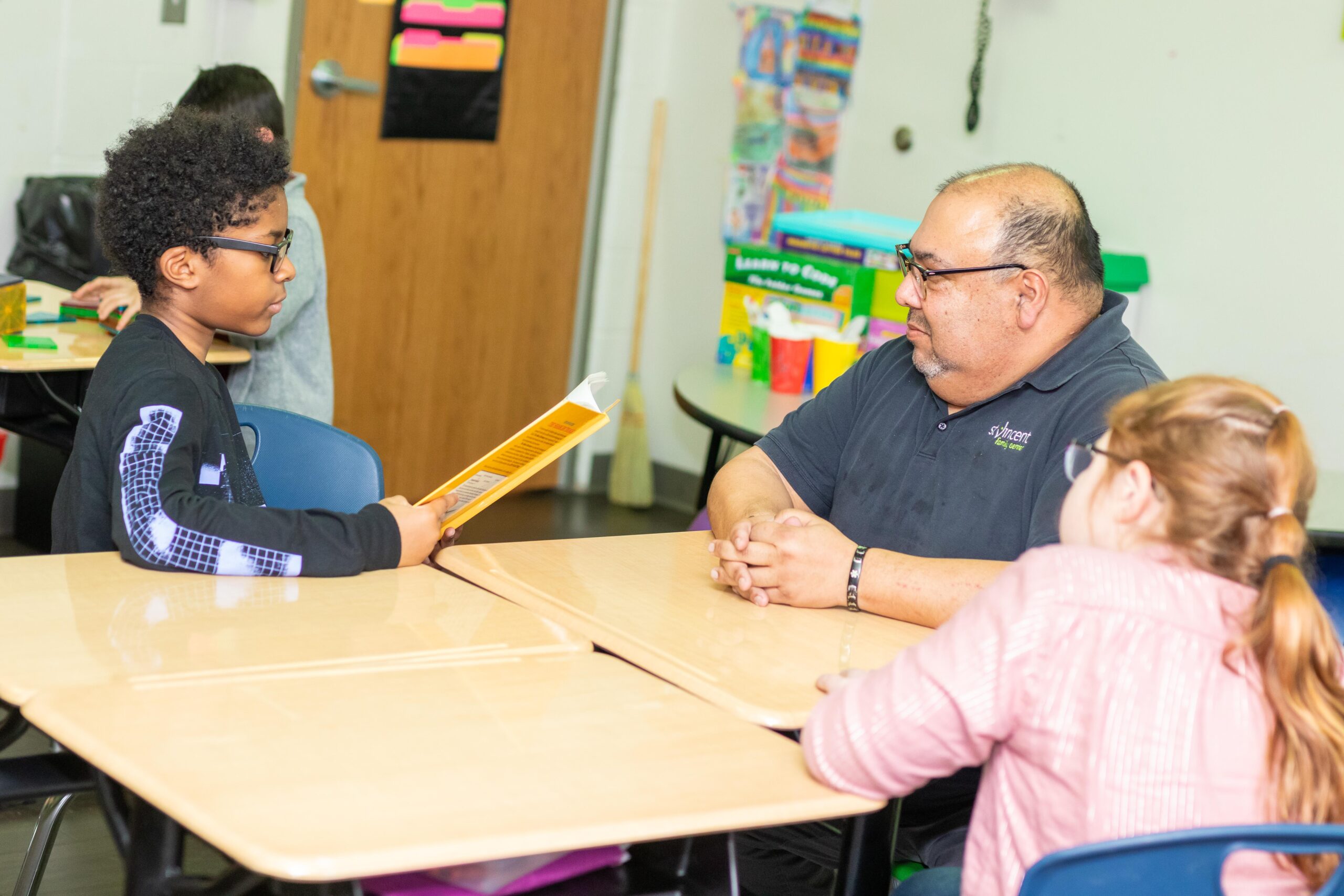Training & Shadowing
Why choose an internship with St. Vincent Family Services?
At SVFS, students receive training related to working with youth and families in a behavioral/mental health setting, including:
- Client and family engagement skills
- Providing therapeutic intervention, and
- Learning clinical documentation and treatment planning.
Master’s Level students receive more training in specific treatment modalities for therapy with youth and families. MSW 2 Students will receive 11 hours of training in: Trauma Focused Cognitive Behavioral Therapy and additional hours in Child Centered Play Therapy and Directive Play Therapy for trauma work.
All students will have the opportunity to shadow in various programs across the agency to see social work practice in individual, group, and family settings.


Experience Opportunities
Students will be offered various experiences to practice direct social work skills, including:
- Treatment Planning
- Clinical Documentation
- Identification and facilitation of therapeutic interventions
- Utilization of assessment tools during individual, family and group settings
MSW 2 students will receive additional training and experience in Diagnostic Assessment.
“I completed my MSW internship in the SVFS Intake department and had a variety of clinical learning experiences while working directly with clients and families. I’ve now been an Outpatient Family Services clinician for over a year and feel that my internship gave me a head start and prepared me for the work I do every day.”
—St. Vincent Family Services Intern
Available Internship Opportunities
Bachelor's Degree in Social Work or other related Human Service Field
Internship Training Program Goal
Students will receive training, shadowing, resources and experiences to gain Bachelor’s level foundational transferable skills applicable to multiple human service settings.
Social Work Internship Training & Materials
- Agency Orientation (including HIPPA/ Policies/ Agency Mission & Vision, Cultural Competency & Bias)
- Promoting Resiliency Through Trauma Informed Care (1.5 hours)
- Cultural Healing and Historical Understanding Through a Trauma Informed Lens (4 hours)
- Clinical Documentation Training – including Ethics of Clinical Documentation (2-3 hours)
- Rapport Building and Engagement Skills Training
- Providing Therapeutic Behavioral Services Training
- Family Engagement and Positive Parenting Strategies
- Additional trainings depending on student time, availability, and interest
Shadowing Opportunities
- Access and Engagement Department – shadowing Diagnostic Assessment appointments
- Community Family Intervention Program – shadowing Treatment Providers
- Care Coordination Program – shadowing Care Coordinators
- Prep Academy (Day Treatment) Program – shadowing Adaptive Behavioral Specialists and Group Facilitators conducting therapeutic groups
- Residential Day Treatment Program – shadowing Treatment Specialists
- Prevention Program – shadow prevention groups in community school settings
Experience Opportunities
- Explore therapeutic behavioral services (TBS) interventions from provided resources and present recommendations that could be appropriate for one of the clients observed during shadowing of community based treatment providers
- Co-facilitate individual youth TBS sessions with a CFI treatment provider (Goal: to utilize interventions identified by the student that the provider deems appropriate for client)
- Support facilitation of prevention groups
- Increase comfortability in speaking with parents and developing interviewing skills by conducting structured needs assessment and service evaluation over the phone with caregivers.
- Practice clinical documentation skills; learn to write progress notes for TBS sessions that the student helps to facilitate
- Learn utilization of assessment tools: Youth Outcomes Questionnaire, Protective Factors questionnaire
- Conduct appropriate transition/termination activities if the student routinely shadows particular clients during the field practice time
Master's Degree in Social Work: MSW 1 Students
Internship Training Program Goal
Students will receive training, shadowing, resources and experiences to gain Master’s level foundational transferable skills applicable to multiple social work settings.
Social Work Internship Training & Materials
- Agency Orientation (including HIPPA/ Policies/ Agency Mission & Vision, Cultural Competency & Bias)
- Promoting Resiliency Through Trauma Informed Care (1.5 hours)
- Cultural Healing and Historical Understanding Through a Trauma Informed Lens (4 hours)
- Solution Focused Therapy (4-5 hours)
- Motivational Interviewing (4-5 hours)
- Clinical Documentation Training – including Ethics of Clinical Documentation (2-3 hours)
- Additional trainings depending on student time, availability, and interest
Shadowing Opportunities
- Access and Engagement Department – shadowing Diagnostic Assessment appointments
- Outpatient Family Services – shadowing therapy sessions (individual, family and telehealth); will observe Play Therapy sessions
- Prep Academy (Day Treatment) Program – shadowing therapeutic groups
- Residential Day Treatment Program – shadowing therapeutic groups and client sessions
- Foster Care – shadowing foster care case managers
- ECMH – meet with an ECMH team member to learn more about work done within daycare centers across Franklin County (shadowing restrictions within daycare settings)
Experience Opportunities
- Explore therapeutic interventions from provided resources and present recommendations appropriate for one of the clients the student has been shadowing sessions for based on treatment goal
- Co-facilitate individual youth sessions with therapist – taking primary lead for 10-15 minutes during first co-facilitation, building to primary lead for full sessions as internship and student comfort progresses (Goal: utilize interventions identified by the student that the therapist deems appropriate for client)
- Option to co-facilitate one or more group therapy sessions
- Increase comfortability in speaking with parents and developing interviewing skills by conducting structured needs assessment and service evaluation over the phone with caregivers.
- Practice clinical documentation skills; learn to write progress notes for sessions the student helps to facilitate
- Learn utilization of assessment tools: Youth Outcomes Questionnaire, Child Adolescent Needs and Strengths (CANS), Resiliency Questionnaire
Master's Degree in Social Work: MSW 2 Students
Internship Training Program Goal
Students will receive training, shadowing, resources and experiences to gain transferable skills applicable to any social work setting and gain integrative skills to gain confidence in providing therapy to youth and families.
Social Work Internship Training & Materials
*indicates items not necessary if student participated in MSW 1 program w/ SVFS
- Agency Orientation (including HIPPA/ Policies/ Agency Mission & Vision, Cultural Competency & Bias) *
- Promoting Resiliency Through Trauma Informed Care (1.5 hours) *
- Cultural Healing and Historical Understanding Through a Trauma Informed Lens (4 hours) *
- Solution Focused Therapy (4-5 hours) *
- Motivational Interviewing (4-5 hours) *
- Clinical Documentation Training – including Ethics of Clinical Documentation (2-3 hours) *
- Treatment Planning & Discharge Planning
- Diagnostic Assessments
- Trauma Focused Cognitive Behavioral Therapy (11 hours, National Child Traumatic Stress Network)
- Child Centered Play Therapy (4+ hours)
- Directive Play Therapy for Trauma work (4+ hours)
- Additional trainings depending on student time, availability, and interest
Shadowing Opportunities
- Access and Engagement Department – shadowing Diagnostic Assessment appointments
- Outpatient Family Services – shadowing therapy sessions (individual, family and telehealth); will observe Play Therapy sessions
- Prep Academy (Day Treatment) Program – shadowing therapeutic groups
- Residential Day Treatment Program – shadowing therapeutic day treatment groups and sessions
- Foster Care – shadowing foster care case managers
Experience Opportunities
- Explore therapeutic interventions from provided resources and present recommendations to supervisor appropriate for one of the clients the student has been shadowing and/or conducting sessions for based on treatment goal
- Co-facilitate then individually facilitate youth and family sessions as internship and student comfort progresses, utilizing interventions identified by the student
- Option to co-facilitate one or more group therapy sessions
- Practice clinical documentation skills; learn and practice writing progress notes and developing treatment plans and discharge planning documentation
- Learn utilization of assessment tools and facilitate the use of some assessment tools as appropriate: Youth Outcomes Questionnaire, Child Adolescent Needs and Strengths (CANS), Vanderbilt, Protective Factors Questionnaire, Beck Depression Inventory, The Child PTSD Symptom Scale (CPSS), Screen for Child Anxiety Related Disorders (SCARED)
- Present a client’s case to a clinical review team
- Conduct appropriate transition/termination activities with clients that the student routinely co-facilitates sessions for at the end of the student’s internship period.
Join Our Team!
Interested in pursuing an internship opportunity at SVFS? Submit your interest form today.
SVFS Internship Manager
Hayley Harris, MSW, LSW

Hayley Harris graduated from Kent State University in 2013 with a Bachelor’s Degree in Psychology, after which she received a Master’s of Social Work Degree from The Ohio State University in 2015. Prior to her work at St. Vincent Family Services, Hayley began her career as a preschool teacher before obtaining her LSW in 2018.
Hayley began her time with St. Vincent Family Services in 2018, working as a Group Clinician and an Outpatient Family Clinician. Hayley now serves as an experienced internship supervisor, providing supervision and learning experiences to numerous students from several different universities. She is passionate about helping children and families reach their fullest potential.
Hayley is trained in EMDR (Eye Movement Desensitization and Reprocessing) and has received an EMDR Child Specialist Intensive Certificate from AGATE Institute: Ana Gomez Attachment Trauma Education. Hayley also received The Walter & Marion English Award in 2022
In her free time, Hayley enjoys spending time with loved ones, journaling, painting and playing with her energetic Australian Shepherds, Nala and Milo.

